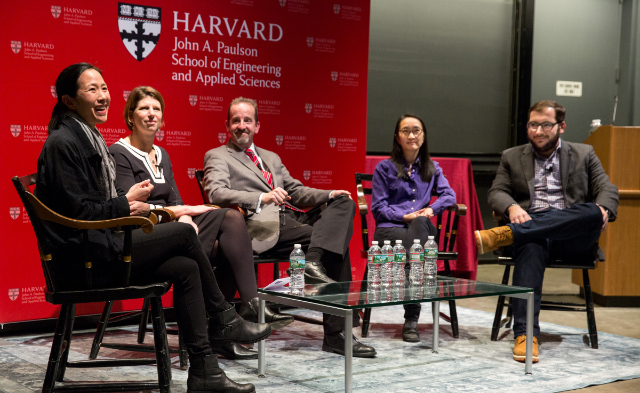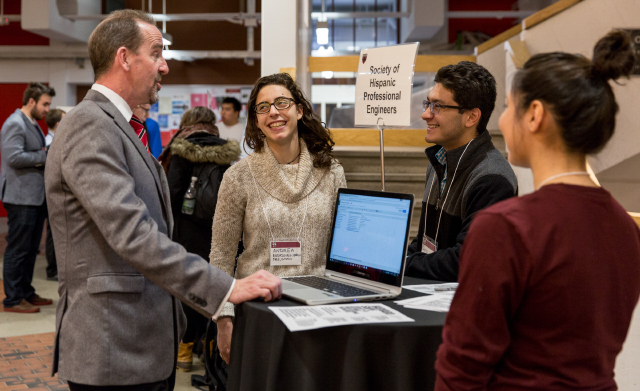News
Dean Frank Doyle moderates a panel discussion of distinguished alumni during the first-ever Sophomore Convocation, an event which drew more than 100 newly declared SEAS concentrators. (Photo by Lori K. Sanders/SEAS.)
The newest members of the Harvard John A. Paulson School of Engineering and Applied Sciences (SEAS) were welcomed into the SEAS community during the first-ever Sophomore Convocation on Feb. 7.
More than 100 sophomores who recently declared SEAS concentrations—applied math, biomedical engineering, computer science, electrical engineering, engineering sciences, and mechanical engineering—gathered at the Science Center to learn about enrichment opportunities, and also hear advice from a panel of distinguished alumni.
To kick off the event, Dean Francis J. Doyle III showcased the variety of undergraduate organizations sponsored by SEAS. These groups have enabled students to build BB-shooting robots, genetically engineer bacteria to clean up pollution, work on engineering design projects in Peru and Hong Kong, and teach middle school students to code.
“At SEAS, there are so many opportunities available to you to tackle hands-on projects, learn new skills, experience other cultures, and for you to make a difference,” Doyle told the students.
That sentiment was echoed by the alumni panelists, who discussed how opportunities outside the classroom helped shape their lives and careers after graduation.

Panelists (from left) Joanne Chang, A.B. '91, Julie Kitchenka Ferland, S.B. ’98, Dean Frank Doyle, Dao Nguyen, A.B. ’94, and Eric Hysen, A.B. '11, shared insights and advice with sophomores. (Photo by Lori K. Sanders/SEAS.)
Dao Nguyen, A.B. ’94, an applied math and computer science concentrator who is now publisher of BuzzFeed, recalled the rewarding nature of her involvement in the student-run Philips Brooks House Association, which organizes community service programs, including enrichment opportunities for low-income children, prisoner education, and social activism.
“That experience really helped me learn about leadership, and working with people, and how to have empathy. It made me a more well-rounded human being,” she said.
For chef and restaurateur Joanne Chang, A.B. ’91, an applied math and economics concentrator, baking cookies for the Leverett House Grill between problem sets not only helped her keep her sanity, it fueled a passion for pastry that she developed into a successful career.
Now the co-owner of six Flour Bakery + Café locations and the Meyers + Chang Restaurant, Chang looked back on her path after college and advised students, especially those considering entrepreneurship, to slow down.
“After Harvard, I kept feeling this sense of competitiveness where I had to open a business or I had to start something great,” she said. “But you have to live your life. The world will still be there. You have to take your time and figure out what makes you tick.”
For Eric Hysen, A.B. ’11, a computer science concentrator who today leads the U.S. Department of Homeland Security Digital Service, finding his true passion took a bit of exploring. He came to Harvard set on studying politics, but gravitated toward the technically challenging problems of computer science.
“I would encourage everyone to look outside of what you are studying and think about how those skills could be applied to other fields,” he said.
Having a broad perspective has been especially beneficial for Julie Kitchenka Ferland, S.B. ’98, an engineering sciences concentrator and general manager of Shell TechWorks. By collaborating with students outside her concentration, she learned soft skills that have helped her achieve success in the oil and gas industry, a brand new field for the former naval architect.
“I am able to walk into a meeting and have the humility to ask questions because I know the people on the other side of the table are coming with a different perspective,” she said. “You should always be ready to learn.”
After the panel discussion, undergraduates mingled and met with representatives from more than a dozen SEAS student organizations.

Dean Doyle chats with representatives from the Harvard chapter of the Society of Hispanic Professional Engineers, one of more than a dozen SEAS student clubs that provided information to sophomores during the reception. (Photo by Lori K. Sanders/SEAS.)
The opportunity to apply computer science to many different fields, as evidenced by the world of student clubs like the Harvard Computer Society, is what appeals to Jose Rafael Hernandez, A.B. ’19, about his chosen concentration.
“SEAS is a place where people have a lot of vision,” he said. “I’m excited to be a part of the school because it sits at the intersection of technology, liberal arts, and the humanities.”
That cross-disciplinary perspective is one of the things that drew Anne Raheem to SEAS. Raheem, A.B. ’19, a biomedical engineering concentrator, is looking forward to learning more about the human body, and then combining that knowledge with her engineering skills to improve the quality of life for patients. The Convocation reinforced the importance of engineering in many different disciplines, she said.
“SEAS is special because it produces people who not only know engineering concepts, but understand the relevance of those concepts in the world, and are then able to communicate that relevance,” she said.
Cutting-edge science delivered direct to your inbox.
Join the Harvard SEAS mailing list.
Press Contact
Adam Zewe | 617-496-5878 | azewe@seas.harvard.edu
